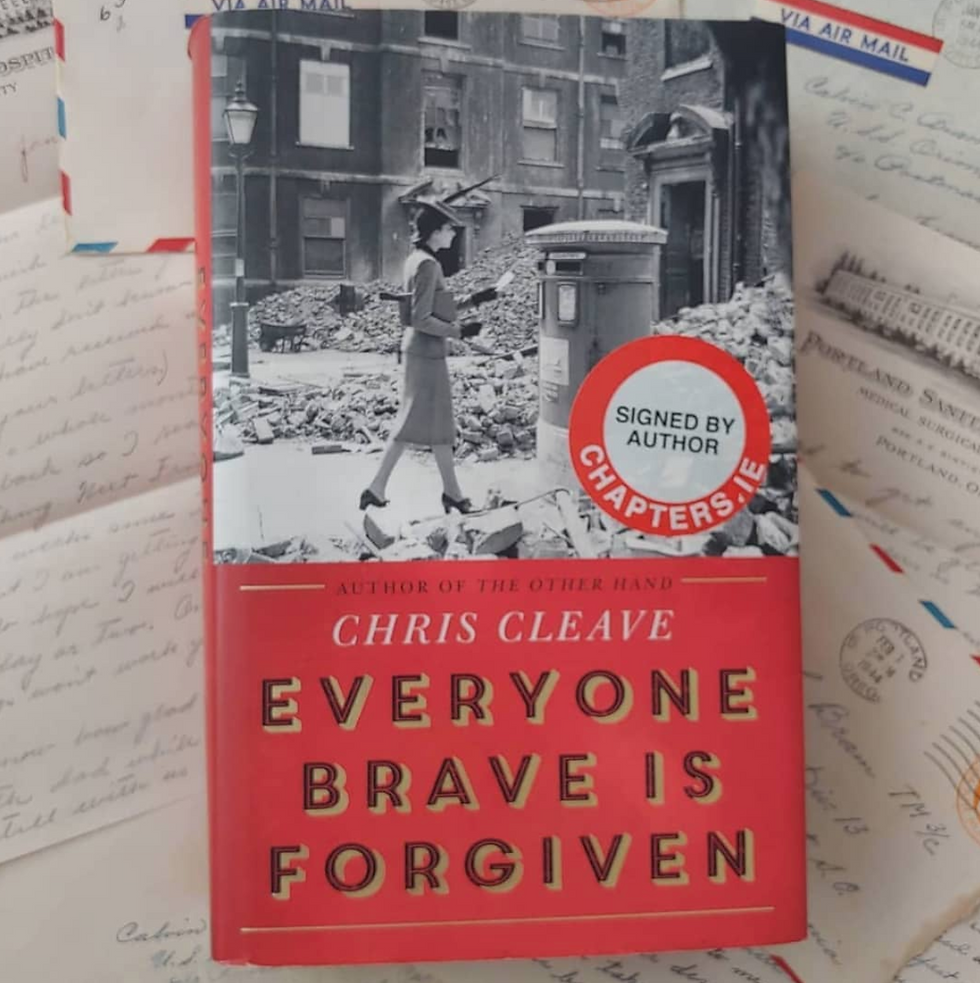Books that Read like Letters.
- Flea Market Love Letters

- Nov 6, 2020
- 4 min read

Back in September of this year, I was invited by the lovely Anne Bogel to join her on the podcast "What Should I Read Next?". Anne recommended three titles -- "Song of a Captive Bird" by Jasmin Darznik, "Everyone Brave is Forgiven" by Chris Cleave, and "Hieroglyphics" by Jill McCorkle -- for me to check out. Read on for what I thought of the three books Anne thought I would enjoy, and what surprised me most about the experience.
The first chance I was in Dublin after recording, I stopped by my favorite used & new stock bookstore, Chapters, a massive sprawling treasure trove (closet to an American second-hand bookstore I've yet to find). I asked the be-speckled attendant for all three titles, please. It turns out "Song of a Captive Bird" and "Hieroglyphics" had fallen victim to the Pandemic: they were nowhere to be found in Chapters, or Ireland it seemed. I had to order them online ultimately. Because of how the world literally shut down in March, many publishing houses (which already contend with different dates for U.S. and U.K. releases) adjusted by, well, cutting their losses. I struggle to think about the number of books that won't be in Irish bookshops this holiday season because of COVID. But it wasn't all bad news -- they had a lovely second-hand copy of "Everyone Brave is Forgiven". And so, this review begins.
"Everyone Brave is Forgiven" by Chris Cleave
While Anne and I were recording I got very, very excited about her recommendation of "Everyone Brave is Forgiven". Goosebumps, I told her, has appeared as she described her first pick for me. As we wrapped the recording, I starred it on my notes. "Everyone Brave is Forgiven" tells the story of the author's grandparents who only met six times before they were married after World War II, their courtship otherwise being largely by letter. The novel deals with lesser traversed themes of War literature like "Why us?" rather than the more popular inherent bravery running theme, which I appreciated probing a bit deeper. Ultimately, it is more interesting to read about real people experiencing war than just the fictional characters we invent to stop it.
In the end, while I found it well written -- an excellent book for cutting your teeth on British World War II witticisms -- I didn't spark with it as many, many readers who messaged me in the days after the episode premiered did. I had dozens of messages about how much I would love "Everyone Brave is Forgiven" while it seemed readers were less familiar with the next two reads: "Hieroglyphics" and "Song of a Captive Bird".
"Hieroglyphics" by Jill McCorkle
The first book I read in 2020 was "Elizabeth Is Missing" which had a very similar feel to "Hieroglyphics". In McCorkle's novel, we meet an elderly couple who have moved and retired to be near their daughter and also near the childhood home of the husband. Both husband and wife had experienced a traumatic loss of family in childhood, one a famous nightclub fire and the other a freak train accident, which play largely through the narrative. There are several "main" characters, told in alternating chapters. There are the elderly couple and a divorced mother of two struggling to keep herself afloat.
Anne chose this book for me as it was about characters revisiting their lives through memory and through short, diary-like letters. I warmed to this book quickly. While it felt slow at points, and I could have preferred a snappier pace, the circling of the narrative felt very appropriate for the subjects which the characters were dealing with: a life lived, love fought for, and finally a sense of declared purpose. This was the read that got me most curious if the next would be as good or better. Up next, last but not least was "Song of a Captive Bird", the book I was sure I wouldn't pick up myself so would I enjoy it?
"Song of a Captive Bird" by Jasmin Darznik

I was fairly honest in talking with Anne that I normally would never pick up a "Song of a Captive Bird" so you can be sure that the fact it was my favorite of the three was a pleasant shock.
This novel deals with the fascinating life of Iranian poet and director, Forough Farrokhzad. I am ashamed to say the most knowledge I had going into this novel was a High School memory of reading the graphic novel, "Persepolis". And "Song of a Captive Bird" blew my socks right off my feet. Told from the perspective of Forough, who lived a complex and creative life until her early death, we explore Iranian life and culture during the middle of the 20th Century.
Darznik's writing is transportive; near transcendent. I could sink into this book and forty pages later I had to wonder why it felt like five minutes had passed.
Final Thoughts:
In October, I was invited back by the "What Should I Read Next" team member, Brenna, for a Patreon Exclusive podcast episode about the reads detailed above. As someone who normally reads within my own lane, Brenna and I talked about how the different styles of books and even order in which I read them affected my experience of them. I would give the entire experience of working with Anne, Brenna, the "What Should I Read Next" team five stars.
Have a book you think I should read? Just want to get in touch? Send me an email at info@fleamarketloveletters.com.





Comments